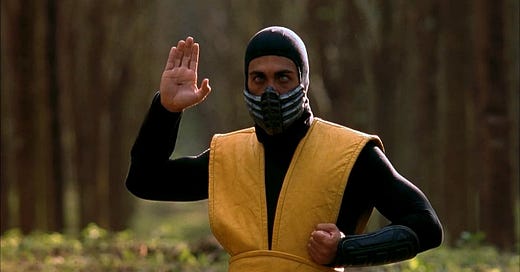Mortal Kombat (1995) Is The First Movie That I Remember Watching
Reflecting on the first movie-watching experience that I can remember, as a five year-old in 1997.
(I mostly wrote this article a while back as the potential start of a series called “Movies I Remember.” I haven’t written another entry and don’t know if I ever will, so I’m putting this out now as a stand-alone post.)
My first experience that I can remember with a movie is having watched Paul W. S. Anderson’s 1995 adaptation of Midway’s Mortal Kombat fighting game series when I was five years-old. I had never heard of the games, and I’m sure that my parents hadn’t either when they rented the movie on VHS in 1997. We probably watched it because my dad had seen a trailer for the upcoming sequel and then rented the first to see if it was any good. When I was camping on the floor of my parents’ room one night, they started the movie on their TV and promptly fell asleep, while I watched it.
I was captivated from the opening scene. A scary-looking, older, long-haired guy grabs a younger long-haired dude by the head, and then tells his brother (another long-haired dude watching from the foot of a massive temple staircase) that, “your brother’s soul is mine!” before snapping said brother’s neck. This struck me especially because I had no idea at the time that someone could kill a person with just their bare hands. (I still haven’t stopped thinking about how someone can simply push their head or someone else’s a little too far to the side a little too quickly and they will just be dead.)
Equally compelling to my young brain was the visual uniqueness and chaotic confusion of that opening scene. As a long-haired kid myself, I was immediately interested that the film portrayed so many long-haired guys. It was probably the first time I’d seen as many Asian actors on-screen together, too, which had given the whole scene a feeling unique to what I was used to from white-ass early-90s television.
The whole character interaction felt like the ending from another movie. I remember wondering if I’d somehow missed a part wherein they’d explained who either of these brothers were, or why that guy was snapping one of their necks. (Additionally, I remember the fucked-up tint on our little old CRT TV causing the sky to be purple behind the pyramid-like temple on which the scene was set, leaving the whole scene dizzyingly visually distinct.)
It’s funny to think that Mortal Kombat was by far the most-violent thing I’d ever seen at five years-old just because the movie is so much less-violent than the video games. I’m sure that a Paul Veerhoven-style, hyper-violent pseudo-comedy would’ve made more sense to fans (and might’ve been the adaptation we would’ve gotten in had this film been made in the 80s), but the 90s were a time when violence was finding refuge in comics, video games and music, while censors were scrubbing it from television and film. I would’ve never ended up watching a properly-violent Mortal Kombat movie as a kid, because my parents didn’t show me what they referred to as “kill-kill movies.”
If the film was held to a PG-13 rating because the producers thought that teenagers were the primary audience of the games, then I think they failed to realize that the core fans would be disappointed by the relative lack of gore. I doubt that the studio producing the film had a stake in leading a younger audience to the games, but that’s what making a mellow-enough movie for me to watch at five years-old as a fan of Power Rangers and Beast Wars accomplished.
I’m not surprised that Mortal Kombat wasn’t critically beloved because the movie barely makes any sense--unless thru the lens of a screenwriter having been tasked to convert a fighting game into a movie.



